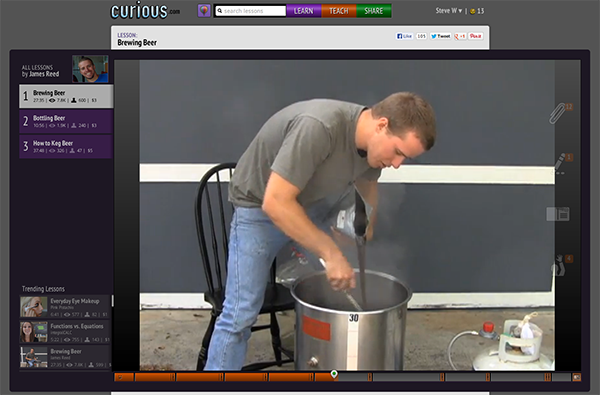The world of online education is buzzing with talks of MOOCs–massive open online courses–that many see as the future of higher education. MOOCs certainly have a place, though I’m not quite sure yet of just what it is. But there is no question that the web has both a massive supply of and demand for more informal educational opportunities. There are thousands of educational video on YouTube, but except for such well known sources as Khan Academy, they can be tough to find and tougher to assess.
Curious.com, a Menlo Park startup launched today, A big problem, wants to get the teachers and the students together and to help would-be web educations make some money in the process. The brainchild of Justin Kitch, who founded Homestead.com and later sold it to Intuit, is starting with about 500 curated lessons covering everything from beer making (photo) to exercise, from art appreciation to HTML coding. For the most part, the lessons stay away from traditional curricular areas, though there is the seemingly inevitable calculus tutorial and favor of more lifestyle and hobby-related content. “Our goal is a better way to deliver online education,” says Kitch. “Curious is a platform and a marketplace for teachers of anything.”
In contrast to many of the instructional videos found on YouTube, a considerable amount of care has gone into the quality of the Curious videos. While the quality of the ones I watched varies, even the worst were pretty good. The player features in-lesson quizzes: The instructor can insert questions into the video timeline. The video pauses and a question pops up on the screen. These can be a help in maintaining engagement or in student self-assessment.
One goal of curious is to provide the informality of YouTube, including the ability to start a course at any time, with something a bit more structures. “We did a lot of research onto how people learn online,” says Kitch. “The research shows you have 90 seconds before you lose someone. The idea is tyo provide a better educational experience than YouTube. YouTube gives a great educational experience, but not instruction.
Some of the lessons are free, but most cost between one and three “Curious coins.” New users start with 20 coins and additional units cost $1. The basic business model is a revenue share between Curious and the instructors.
The big test here is whether customers will part with their money in a world in which courses taught by professors from Stanford, Harvard, and MIT are available free. Succeeding in those formal courses, however, requires a heavy commitment of time over six to ten weeks, which explains why typically more than 90% of the students who enroll fail to complete the course. Curious offers lighter, smaller bites and just might succeed.


